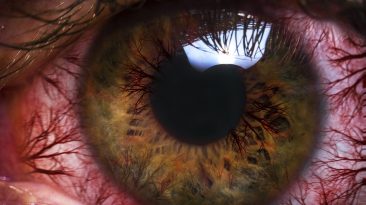How long can your brain live after your body dies? Could your loved ones still communicate with you? And does your body contain the zombie gene?
According to a study in the year 2013, 72% of Americans believe in an afterlife. And some people, like professor Robert Lanza, have proposed a theory that death is just a figment of our imagination. The theory states that death has no actual boundaries that define it, and therefore, it just isn’t real in the sense you’ve been trained to accept.
As professor Lanza explains, we perceive the sky as blue. But if the cells in our brain changed to make us think the sky was green, our perception of reality could all be faulty programming. So is the sky blue, or is it all just in our heads?
If our final moments on Earth are all just an illusion, does that mean you can come back from death?
At what point do you stop living and become dead? First, remember that death is a process, not an absolute. And for 95% of people, the process starts when the heart stops beating. After that, your breathing stops and your muscles lose tension. It’s just a matter of time before your brain shuts down. But you’re not on the other side yet.
A study called AWARE, Awareness during Resuscitation, looked at thousands of survivors of cardiac arrest who had been pronounced dead. Some of the people interviewed recalled the exact moments of their death, and they reported seeing and hearing the events leading to their resuscitations. How is that possible?
Well, it turns out your brain can remain alive for up to 10 minutes after your heart stops. That means you might hear the doctor declaring you dead. Nine percent of people who had a near-death experience described floating above their body tethered by an invisible string. While you might hear everything going on, your body would remain dead without oxygen or blood pumping to your organs. But what would be going on inside you?
While rigor mortis sets in and your muscles begin to stiffen, other cells would just be getting to work. Over the next 12 hours, your body would start to shut down fully. And during this time, some genes stimulate inflammatory cells called glial cells to clean the inside of your brain.
These cells would continue to expand and thrive while your body grows colder and your other systems shut down. These “zombie genes” would grow arm-like appendages and develop while the genes in your brain disintegrate. But once you’re dead, would your loved ones ever be able to communicate with you again?
Before the development of infrared photography, seances were common among family and friends who wanted to speak to their dead loved ones. Now, we have the technology to prove a fake spiritual encounter. But since we don’t have definitive proof of life after death, it’s understandable that many people find peace in the thought of talking to the dearly departed. But what if we did have proof of what happens after death?
I mean, if we could prove that something else was waiting for us after we leave our bodies, our perceptions of this life might grow dim. If we knew something more profound was waiting for us, some people might not wait for lives to end naturally to claim an eternal reward. But the end of our lives may not be a spiritual experience at all. Instead of seeing a white light, you might see ones and zeroes.
Ray Kurzweil, director of engineering at Google, predicts that we could upload digital copies of our brains online. Your life and personality could live on in the computers of tomorrow. If your consciousness were uploaded into the cloud, your mind would live on as long as the server lasts. So you might want to pay for backup storage.
If we could prove there is life after death, you might view yourself and your life with a renewed sense of wonder and appreciation for what you have now. But what if you didn’t have the time to appreciate your life on Earth? What if you only lived for 24 hours?
Sources
- “How Futurists Claim ‘Immortality’ Will Be Possible”. 2013. Huffpost.
- “A framework for approaches to transfer of a mind’s substrate” 2021. sim.me.uk.
- “COALESCING MINDS: BRAIN UPLOADING-RELATED GROUP MIND SCENARIOS” 2021. stuff.kajsotala.fi.



























